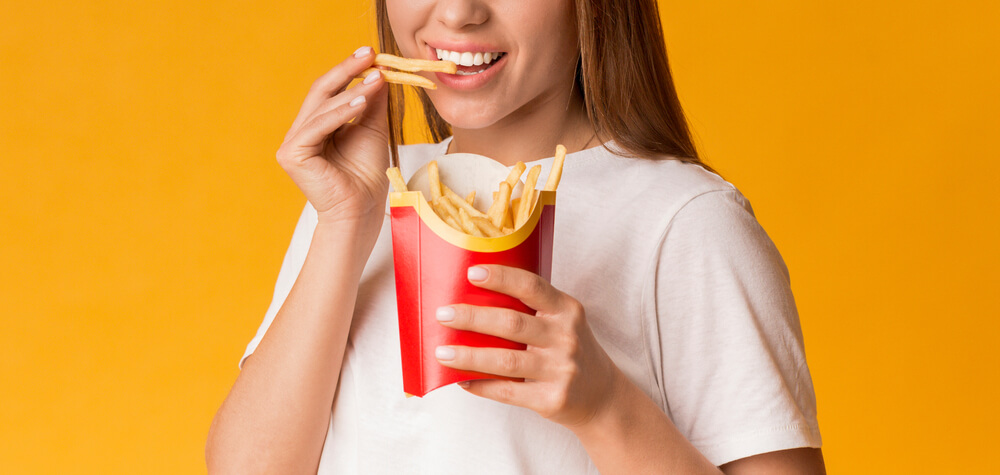
Do you feel as if you have a compulsive need to overeat? If so, you could be addicted to food. The idea of suffering from food isn’t a new one. After all, Overeaters Anonymous (also known as OA) was first launched in 1960 in Los Angeles. However, the idea hasn’t widely been accepted until the last few years.
The concept of being addicted to food is one that has only recently started to gain support. This is thanks to studies that have been carried out into the effect that compulsive overeating has on the brain’s pleasure centers. Experimentation in humans and animals have shown that, for some people, the identical pleasure and reward centers in the brain that react to addictive substances such as heroin and cocaine can also be activated by food, and especially foods that are rich in salt, fat and sugar. Just like addictive drugs, these foods can trigger chemicals like dopamine in the brain which make us feel good. Once someone has experienced the pleasure caused by increased dopamine in the reward pathway of the brain from eating these foods, they soon want to eat again.
Why Do People Become Addicted To Food?
The reward signals that highly palatable food causes in the brain can override the brain’s other signals of satisfaction and fullness. This makes compulsive eating just like other forms of behavioral , which means that people become preoccupied with specific behaviors that trigger intense pleasure. People who are addicted to food become preoccupied with eating, losing all control over their eating behaviors. They find that they spend an excessive amount of time overeating and involved with food, or anticipating the emotional impact of their compulsive overeating.
People with food also often develop a form of tolerance to food. This means that they end up eating more and more while finding that the food they used to love satisfies them less.
Experts believe that to food has a key role to play in obesity, yet people of a normal bodyweight can also struggle with this type of . It’s possible that their bodies are just genetically programmed so that they can handle those additional consumed calories more efficiently, or perhaps they are more physically active and this compensates for their overeating.
People with a food continue eating even though there are negatives consequences like damaged relationships and weight gain. Just like people with a gambling or drug , those with food struggle to cease their behavior, even when they try and want to cut back.
What Are The Signs Of Food Addiction?
There are several signs that indicate that someone is suffering from an to food:
Craving Food Despite Feeling Full
People with food experience cravings for food, even when they’ve eaten a nutritious, fulfilling meal. For example, if they’ve eaten a large main course, they still crave a dessert.
Hunger and cravings aren’t the same. Cravings occur when you have an urge to eat, even if you’re already full or have already eaten. Having food cravings is common and it doesn’t mean necessarily that somebody is addicted to food. Yet, if you often get cravings and ignoring or satisfying them is difficult, this may indicate a problem. These type of food cravings aren’t about needing nutrients or energy, it’s your brain needed something to release dopamine.
Eating More Than Intended
For food sufferers, there’s no such thing as just one piece of cake or a square of chocolate. One piece becomes a whole cake, and one bite becomes twenty. This type of all-or-nothing approach is something that’s seen in all types of . Moderation just doesn’t work. Telling somebody with an to food to only eat in moderation is like telling somebody who is an alcoholic to drink in moderation – it can’t be achieved.
Eating Until You Feel Excessively Full
When somebody with an to food gives in to their cravings they may not be able to stop eating until that urge has been satisfied. At that point, they may then discover that they’ve eaten so excessively that their stomach hurts.
Feeling Guilt But Not Being Able To Stop
Trying to control how much unhealthy food you eat but then giving into that craving often leads to guilt. Yet, despite those unwanted feelings, somebody with a food repeats the pattern over and over.
Making Excuses
When it comes to , the brain operates in strange ways. When somebody decides to try to steer clear of their trigger foods they often create their own unusual rules which are difficult to follow. When someone with an to food is faced with one of their cravings they often find a way to work around the rules that they’ve created so they can give into that craving. This way of thinking often resembles that of someone who is trying to give up smoking. They may think that if they’re not buying cigarettes themselves, they’re not really a smoker, but they may still smoke cigarettes given to them by a friend.
Repeatedly Failing At Setting Rules
If someone struggles with their self-control they often try to set themselves rules. Yet those rules virtually always fail. Rules that are set around eating are just as likely to fail. People with food often set a rule of having a single cheat day each week, or only eating trigger food at the weekend, but then they fail to adhere to that rule.
Hiding Eating Behaviors
People who have a history of repeatedly setting rules then breaking them often begin to hide their eating behaviors from other people. They often prefer eating alone, perhaps in their car or after the rest of the household has gone to bed.
“On the way home from work I would grab three cheeseburgers from the drive thru and sit and eat them in a parking lot before I went back to the house,” Jacques, a salesman and father of two who has been battling food for the past 6 months admits. “Then I would chew gum and clean my hands with sanitizer so that my wife wouldn’t smell the telltale burger odor on me.”
Inability To Quit Despite Physical Issues
The foods you eat may affect your health and well-being significantly. In the short-term, eating junk food leads to acne, weight gain, fatigue, bad breath, and poor dental health along with other common issues. If you eat junk food in the long-term, you can become obese, develop type II diabetes, Alzheimer’s Disease, heart disease, dementia, or cancer. People who experience these problems due to how much junk food they consume are still unable to eat differently, even when they recognize the problems that their eating has caused.
Rachel, a mom of three who was diagnosed with Type II diabetes after suffering from food for a decade says: “I could see quite clearly what overeating had done to my body, but I just found it impossible to stay away from chocolate and cookies. I would tell myself in the morning that this would be the day I quit, but then by lunch time I was reaching for the cookie jar again. It was just impossible to stop.”
Do I Have An Addiction To Food?
There are certain questions that can be asked to work out whether you have an to food. Ask yourself the following:
Do you end up over-eating when you begin to eat certain foods?
Do you carry on eating certain foods even when you’re not hungry any more?
Do you eat until you feel sick?
Do you worry about not being able to eat certain kinds of food, or worry about how you can cut down on eating certain food types?
If certain foods can’t be obtained, do you go to extreme lengths to get hold of them?
Do you eat certain foods in such large amounts or so frequently that you’re eating rather than spending time on recreational activities, with your loved ones or working?
Do you avoid social or professional situations where specific foods are available since you’re afraid that you’ll overeat?
Do you struggle to function properly at school or work because of eating and food?
Do you feel agitated and anxious if you try to cut down on your favorite foods?
Does eating make you feel guilty or depressed?
Do you find that you have to eat more food to increase your pleasure or reduce your negative emotions?
Do you find that eating the same amounts of food no longer increases pleasure or reduces your negative feelings like it used to?
If you answered yes to many of these questions, you could be suffering from an to food.
Is There Any Help For People Suffering From Food Addiction?
At the present time, scientists are still trying to find effective ways to treat to food. Some believe that recovering from this type of could even be harder than recovering from other forms of since those with a food must still eat to survive and therefore cannot abstain completely.
Psychologists, nutritionists and doctors with a specialist understanding of food could help you to break your compulsive overeating cycle. There are also programs that can help those with an to food. For example, Overeaters Anonymous (OA) has programs in Southern California that can help those who are struggling to quit overeating.
There are a few things you can do to make it easier to give up eating junk food. You can:
- Write a list of the different foods that you crave and that cause you to binge. These trigger foods should be avoided completely.
- Write a list of all the fast food outlets that serve healthier foods and write down the healthy options they serve. This can help you to avoid relapsing when you’re hungry and can’t be bothered to cook.
- Think about which foods you’re going to eat each week – preferably those that you like and already eat regularly and which are also healthy.
- Avoid dieting. Put your weight loss goals on hold for around 1 – 3 months. Overcoming your to food is challenging enough without adding restrictions and hunger into the mix.
Once you’ve taken these initial steps, you should then set a definite date from which point you won’t touch your trigger foods again/
Remember, though, that most people who have an , whether it be to food, gambling, alcohol or drugs, try to quit a number of times before finally succeeding. Although it is possible to overcome your without getting professional help, it’s often beneficial to seek out medical support and professional guidance.
There are many support groups and health professionals in Southern California that can help you to overcome your . Finding a psychiatrist or psychologist with experience in treating food is a good way to get the one to one support you need, however, there are also a number of group options available free of charge too. Food Addicts Anonymous, Overeaters Anonymous and Food Addicts In Recovery Anonymous all have branches in Los Angeles and the wider Southern California area and meet regularly to offer the necessary support to overcome food .

Addiction to food is an issue that can rarely be resolved without taking definite action. If you don’t make a conscious decision to finally deal with the problem, there’s a good chance that the problem will only get worse over time. Eventually, it will result in chronic physical and mental health issues, including obesity, diabetes, depression, self-esteem issues, and even cancer.
The first step to overcoming your to food involves finding healthier alternatives to the trigger foods that you crave, setting a definite date on which you’re going to quit eating those foods and planning ahead for the food that you’re going to eat each day so that you don’t give into temptation. Seeking help from support groups, clinics and health professionals is also the best way to gain the strength that you need to move on and overcome your .
